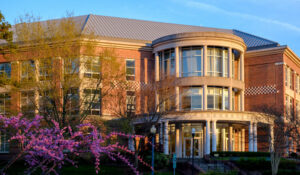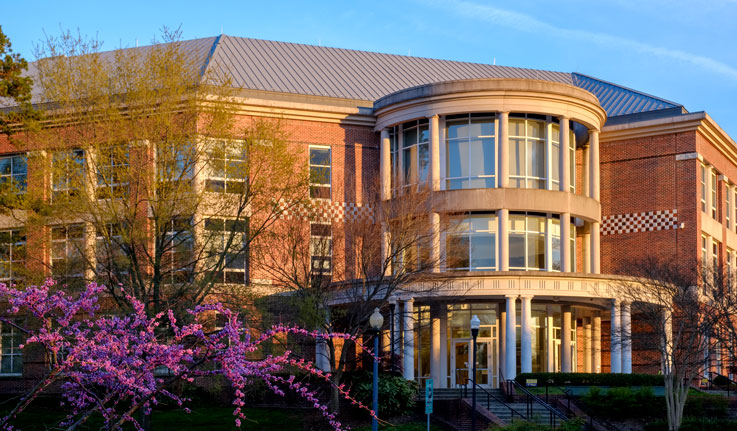 Last fall, UNCG received funding from the Mellon Foundation for transformative initiatives aimed at increasing participation of humanities’ undergraduates in research. Under the leadership of Dr. Joanne Murphy in the Department of Classical Studies, three competitions were created and humanities’ faculty from across campus were invited to submit proposals. In all, 18 awards were made under these three categories: Humanities Faculty Groups, Interdisciplinary Faculty Student Collaborative Groups, and Individual Humanities Faculty.
Last fall, UNCG received funding from the Mellon Foundation for transformative initiatives aimed at increasing participation of humanities’ undergraduates in research. Under the leadership of Dr. Joanne Murphy in the Department of Classical Studies, three competitions were created and humanities’ faculty from across campus were invited to submit proposals. In all, 18 awards were made under these three categories: Humanities Faculty Groups, Interdisciplinary Faculty Student Collaborative Groups, and Individual Humanities Faculty.
Since December, more than 80 faculty have participated in interdisciplinary networking events and more than 50 have attended workshops on undergraduate research.
Sub-awards have been granted to 60 faculty members and 37 faculty received funding to redesign 42 classes in 13 different subject areas focused on undergraduate research skill development. More than 1,200 students will participate in these classes.
Also, 22 faculty will be supported through the new interdisciplinary projects. For those projects, faculty and students came together to create eight interdisciplinary groups whose topics range from studying the slave populations of North Carolina, to visualizing voter data, to a diachronic and global study of memory and landscape. Twenty-three students will be supported to conduct undergraduate research as part of these groups.
Humanities faculty groups
The following faculty groups and projects were created and funded, to integrate undergraduate research skills development (RSD) and course based undergraduate research experiences (CUREs) into classes.
Art and Social Practice
Lee Walton (group leader), Sunny Spillane, Barbara Campbell Thomas, Adam Carlin, Leah Sobsey
Transforming the Humanities at a Minority Serving Institution
Greg O’Brien (group leader), Rick Barton, Mark Elliott, Arlen Hanson, Mark Moser, Lisa Tolbert
Undergraduate Research in the English Curriculum
Scott Romine (group leader), Karen Weyler, Risa Applegarth, Heather Brooke Adams, and Jen Feather
Enhancing Undergraduate Research Across the LLC Curriculum
Roberto Campo (group leader), Mariche Bayonas, Alejandro Hortal, Brooke Kreitinger, Kathleen Macfie, Carmen Sotomayor, Matthew Sutton, and Amy Williamsen
Interdisciplinary faculty-student collaborative groups
Faculty and students from different disciplines will work together in groups around a common research or pedagogical theme or community-engaged project. Funding was awarded to the following projects:
At the Intersection
This project explores how engagement with art as research method, specifically theater, provides college students with the opportunity to think critically about humans and society, and to work inclusively and collaboratively to analyze the history of inclusion. Interdisciplinary collaboration and mentoring will support student researchers as they develop research, writing and presentation skills that will prepare them to “help us envision where are going” and our potential for an inclusive future.
Rochelle Brock (faculty group leader), Sarah Hankins, Lalenja Harrington, and Marcia Hale. Student awardees include Torey Allen, Kara Yost, and Catherine Minton.
Unsung Heroes of the Civil Rights Movement
Researchers will collect and record oral histories of lesser known people who stood beside their more famous counterparts such as Dr. Martin Luther King, Jr., Rosa Parks, Medgar Evers, John Lewis and others. Student teams will record these oral/video histories in the form of 4K (high definition) video. The students will be taking part in what is planned to be a national project that spans six decades of history, from 1960 to 1980 in its initial phase, and, later, from 1980 to the present
Matthew Barr (faculty group leader), Jennida Chase, Hassan Pitts, and Torren Gatson. Student awardees include Arielle Smallwood, Jamira Adams, and Zariyah Blackmon-Tate. The Library Support Team includes David Gwynn, Beth Bernhardt, Richard Cox, Erin Lawrimore, and Vaughn Stewart.
Visualizing Voter Data from the Center for Legislative Studies
For this project, researchers will create data visualizations from raw data about North Carolina voters and elections to illustrate and narrate key concepts in the humanities like fairness, equality, cheating, and power as they are instantiated in North Carolina politics. The Department of Political Science will gather and process publicly available data from the North Carolina State Board of Elections and help formulate useful questions and possible answers that can be illustrated with the data. The School of Art will help to refine these questions and design visualizations to provide unique and intriguing representations of them. The stories communicated through the data visualizations will be available to voters, political reporters, and academics through the website of the Center for Legislative Studies at UNCG.
Gregory McAvoy (faculty group leader), David Holian, Rachele Riley, and Christopher Cassidy. Student awardees include Ariana Garcia and Laura Lazarini.
Memory and Landscape
This group focuses on how memory and landscape influenced the creation of community identities in the past. The group intensely engages with the myriad ways in which the convergence of shared memory and place influenced a sense of belonging, reinforced boundaries between and within groups, and asserted particular claims about the past and identities of communities. Through diverse case studies drawn from a variety of regions, time periods, and methodological approaches, the group will consider how communal engagement with stories, memories, and physical remains of the past shaped group identities in Bronze Age and Archaic Greece, the Roman Empire, the Byzantine and Islamic Eastern Mediterranean, the pre-colonial Caribbean, the early modern Atlantic World, and in the American South.
Robyn Le Blanc (faculty group leader), Linda Stine, Joanne Murphy, Christopher Hodgkins, and Asa Eger. Student awardees include Abbey Linnell, Malcolm Motley, Carelle Robinson, Michael Bell and London Nance.
Walking: A Critical + Creative Research Practice
This project is a humanities-based initiative that explores the practice of walking and moving through space as a critical and creative research method across disciplines. This proposal brings together undergraduate students and faculty together from four different disciplines. In defense of humanity, we will examine the value of consciously slowing down to walk, drift aimlessly, get lost, discover, and meditate on the self and the everyday. This research acts as a resistance to our current competitive cultural obsession with production (at any costs) to focus on more mindful, humble and human approaches to the production of experience. This project will engage with the Greensboro Project Space, an off campus contemporary art center that serves both UNCG and communities in Greensboro.
Lee Walton (faculty group leader), Clarice Young, Gavin Douglas, and Jennida Chase. Student awardees include Alexandrea Vilchis, Arielle Smallwood, and India Baldwin.
The Boundaries of Free Speech and Assembly – Confronting Injustice in Public Spaces
This project calls attention to the long history of struggle by people in the United States and around the world to assert their voices to advance democratic empowerment in public places. These are often contested spaces where individuals assemble in collective action to resist or challenge prevailing norms, structures and institutions of unequal power.
Spoma Jovanovic (faculty group leader), Michael Frierson, and Thomas Jackson. Student awardees include Ariel Brown, Shawn Smith, Marcus Hyde, and Jaqoune Lewis. Affiliated faculty and community participants include Erin Lawrimore (Jackson Library), John Swaine (International Civil Rights Center and Museum), William Harris (University of Pennsylvania), Jeff Jones (UNCG), Michael Sistrom (Greensboro College), Linda Brown (Bennett College), Risa Applegarth (UNCG), Cris Damasceno and Roy Schwartzman (UNCG).
Placing the History of Slavery in North Carolina: Digital Humanities on the Local Landscape
The goal of this project is to engage students in the creation of interactive digital content about the lives of enslaved peoples that is informed by archival documents and connected to specific places across the state. Using GIS technologies and a location-based content curation framework (Curatescape), and with guidance from their faculty mentors, the students will design, implement, and launch an app that connects archival documents in the Digital Library on American Slavery with specific places in North Carolina. With support from faculty mentors and the People Not Property Project Coordinator, students will engage critically and creatively with the intersections of location, memory, and memorialization in historical and contemporary landscapes. The ultimate goal of the project a lasting and adaptable interface for public engagement with location-based narratives of slavery in North Carolina and an invaluable experience in community engagement and content curation for a group of three students
David Gwynn (faculty group leader), Claire Heckel, and faculty and students from the following programs/departments: History, Archaeology, Geography, Environment and Sustainability, African American and African Diaspora Studies, and Library and Information Sciences
Africans in the Greco-Roman World
The purpose of the project will be to help students, faculty, and members of the broader community do a number of things: (1) Better understand the role of Africans in the ancient Greco-Roman world through an examination of history, language, material culture, literature, and art; (2) Build on existing research by faculty members in various disciplines in the humanities, connect their work to each other, possibly create new ways of understanding their own work, and open up new research avenues and teaching content; (3) Engage the campuses and broader community on this rich and expansive topic through a combination of public lecture by guest speakers Dr. Sarah Debrew (Classics, Stanford University) and holding a ‘Conversation with the Community’ centered on teaching Africa in global history, and having students present their work with faculty at the CACE conference and the Honors Symposium in Spring 2020.
Omar Ali (faculty group leader), Hewan Girma, Rebecca Muich, and Maura Heyn. Student awardees include Janelle Crubaugh and Denaisha Wortham.
Individual humanities faculty
Funding was awarded to the following projects, for faculty to integrate undergraduate research skills development (RSD) and/or Course Based Undergraduate Research Experiences (CUREs) into classes:
An Exploration of Music Teacher Identity Construction
Tami Draves
Transforming the Study of History through Role-Playing
Joseph Ross
Cross-Disciplinary Approaches to Early Modern Literatures, Arts, and Cultures
Veronica Grossi
African Art: Modern to Contemporary
Elizabeth Perrill
Extending the Research Process in RCO Capstone Courses
Sara Littlejohn
Write for your Life! Reading and Writing Diverse Lives
Sarah Krive



